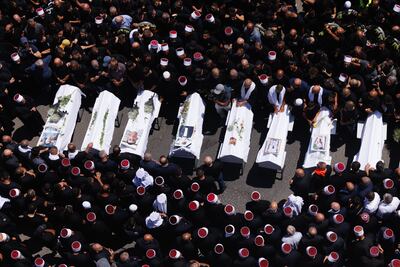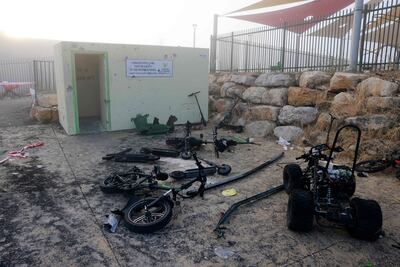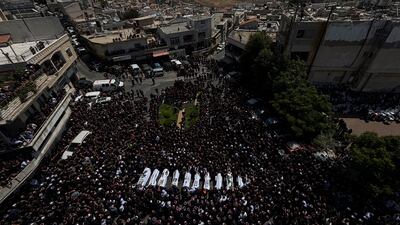Live updates: Follow latest on Israel-Gaza
Israelis reacted with a mixture of horror and anger after a rocket strike on Saturday killed 12 people, most of them children, in the occupied Golan Heights with many now fearing a devastating war with Hezbollah.
Residents in the north of Israel have warned for about 10 months that a miscalculation in the retaliatory rocket fire and air strikes between Israel and Hezbollah in Lebanon on a near daily basis could spark a full-scale war.
Sarit Zehavi, a security expert on northern Israel who lives in the western Galilee, told The National that “it felt like a matter of time until something like this would happen”.
“Each time I went to a graduation ceremony of one of my kids during the past month I asked myself what would happen to us since we saw an increase of Hezbollah attacks in un-evacuated areas [where we live],” she said.
Israel seized the Golan Heights from Syria in the 1967 war and annexed it in 1981.
Neighbouring Druze communities to Majdal Shams within Israel serve in the country’s military and have joined the chorus of outrage after the attacks.
Lior Shelef, an Israeli reservist and volunteer fireman who serves on his kibbutz home a short distance from Majdal Shams, told The National that the strike “should be a trigger for war”.
Mr Shelef, whose family was forced to evacuate after October 7 along with tens of thousands of other Israelis who live in border regions, also criticised Prime Minister Benjamin Netanyahu.
“I’ve been in reserve duty for almost 300 days and my family is evacuated in a hotel. If that’s not a trigger for a war already then I don’t know what is,” he said from his car, as he rushed towards fires caused by a heavy barrage of Hezbollah rockets on Saturday.
Mourners at a funeral for 10 of the victims were angry at government ministers in the crowd, The Times of Israel reported, with one man shouting to applause: “You abandoned us for nine months and now you are here?”

Opposition politicians were also in attendance, including opposition leader Yair Lapid, who criticised the government on X, writing that their response to the strike was “an insult to the residents of the north”.
“Your job is not to explain what should have been done, but to do it,” he wrote.
On Sunday afternoon, Mr Netanyahu landed in Israel after cutting his US trip short. He was criticised for being outside of the country at the time of the strike.
Trade in blame
The strike was swiftly condemned in Lebanon and internationally.
Hezbollah denied being behind the attack.
Rumours soon spread that the deaths were caused by an Israeli military air defence interceptor. Syria also accused Israel of being behind the incident.
Dr Yehoshua Kalisky, senior researcher at Israeli think tank INSS, said the rumour was a “big lie” because the Iron Dome air defence system did not have enough time to intercept the short-range Falaq-1 rocket which Israel said was the projectile used in the strike.
“There’s also no way an Iron Dome interceptor could cause such damage because they do not detonate. They just lead to metal debris, which can hit a person but never the sort of detonation injuries that we saw, which have meant that some of the bodies are still not identifiable,” he said.
“My impression is that this was a mistake. [Hezbollah] was aiming at a military base but missed because these rockets are inaccurate. It does not diminish responsibility. The children are massacred. Hezbollah should be punished for this.”
The attack renewed calls by some in Israel for a full-on war in Lebanon.
Far-right National Security Minister Itamar Ben-Gvir said on X that his “heart is broken to pieces [for the] innocent little children who all wanted to play football”.
“We will not rest until we take revenge on the despicable terrorists who mercilessly beat and slaughtered our children.”

A large operation has been advocated by coalition partners closer to the political centre, including Defence Minister Yoav Gallant who reportedly favoured a pre-emptive strike against Hezbollah soon after the October 7 attacks.
Advocates of war say it is the only way to restore security in the north and bring back residents.
They claim a ground operation is the best way to destroy the sites and supply points Hezbollah uses for its short-range rocket and anti-tank missile attacks.
Dr Kalisky, who did not support a full-scale war fearing it would endanger Israeli hostages in Gaza and inflict intolerable damage on Israel, said the short-range attacks remain a “problem” for Israel.
“Israel’s air defence has several excellent layers against medium and long-range threats, so between about 4km to 200,” he said.
“There is a ‘problem’ for very short-range threats. The only way the army can deal with that threat is to attack the sources of the fire. There is no way to defend once they are launched.”


